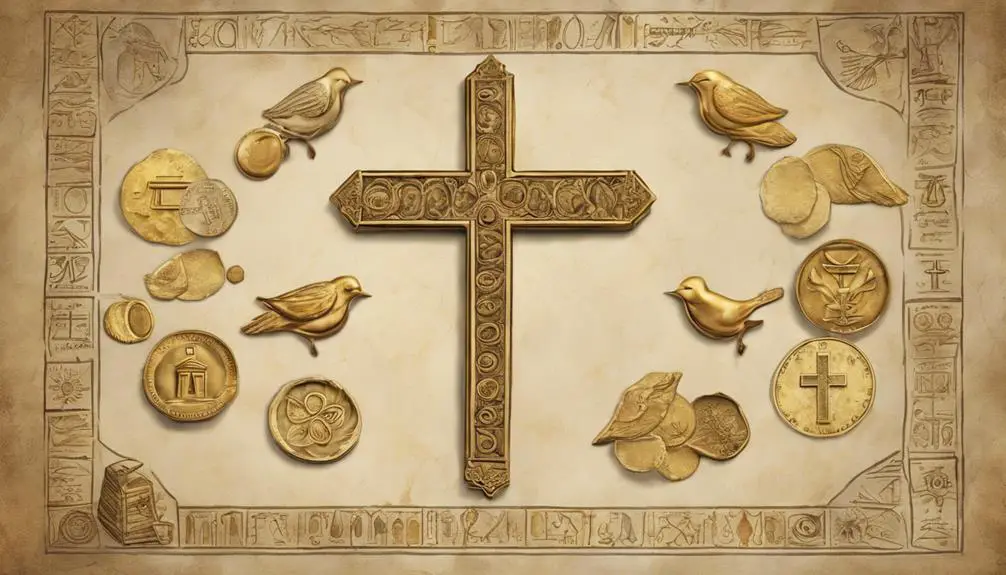Gain insights into the symbolic meaning of the number 20 in the Bible, a figure often indicating periods of waiting or trial.

What Does the Number 20 Represent in the Bible
In the grand tapestry of the Bible, numbers often carry more weight than what's seen at the surface. You've probably stumbled upon the number 20, either subtly woven into a verse or standing bold in a chapter, and wondered about its significance.
Biblical scholars suggest that it symbolizes a period of waiting or a time of trial. But why 20? And how does this interpretation apply to different instances where 20 appears in the Bible?
Let's journey into the depths of biblical numerology and uncover the profound messages encapsulated in this often overlooked number.
Key Takeaways
- The number 20 in the Bible often symbolizes a period of waiting, endurance, spiritual growth, and maturation.
- It is frequently associated with significant biblical events and figures, indicating foundational establishment and spiritual warfare.
- In both Old and New Testaments, the number 20 appears in contexts of promised fulfillment and enduring faith.
- Modern interpretations of the number 20 lean towards themes of redemption, resurrection, teamwork, and balance.
Biblical Significance of Numbers

Delving into the biblical significance of numbers, you'll find an intriguing blend of symbolism and prophecy intricately woven into the scriptures. This Numerological Understanding forms a complex Heavenly Arithmetic, where numbers often hold deeper spiritual connotations.
Take note, it's not about numerology in the occult sense, but a theological exploration of how numbers can symbolize divine truths. Each number in the Bible has a unique resonance, a specific frequency that echoes throughout the Old and New Testaments. They're not merely quantitative indicators; they're qualitative, carrying distinct spiritual meanings.
For instance, the number one often signifies unity and primacy, while seven, a number of fullness and completion, frequently appears in contexts of divine perfection. Then there's the number twelve, representing governmental perfection or divine authority.
As you continue your journey through this heavenly arithmetic, you'll encounter patterns and recurring themes, revealing a divine hand at work. You'll begin to see how the use of numbers in the Bible isn't arbitrary; it's a meticulously crafted tapestry of divine revelation. Remember, it's all about discernment and interpretation, allowing the Holy Spirit to guide you in understanding these spiritual truths.
The Number 20 in Old Testament

As you journey deeper into this celestial arithmetic, you'll encounter the biblical number 20, a figure with significant resonance in the Old Testament. The number 20 is symbolic and frequently used to denote periods of completeness, waiting, and preparation.
For instance, you'll notice that several leaders had 20-year reigns, such as Jerubbaal (Judges 8:28), Jotham (2 Kings 15:30), and Manasseh (2 Kings 21:1). These reigns, lasting two decades, marked significant periods of leadership in the history of Israel.
Let's consider more about the number 20 through a four-point list:
- The Ark of Covenant returned to Israel after 20 years of Philistine capture (1 Samuel 7:2).
- Jacob waited 20 years to get his wages from Laban (Genesis 31:38-41).
- The Twentieth generation from Adam through the line of Seth was Abraham, the father of the Jewish nation (Genesis 11:32).
- Solomon spent 20 years building the Lord's house and his own palace (1 Kings 9:10).
These instances highlight how the number 20 in the Old Testament often signifies a complete cycle, a period of waiting, or a time of preparation.
The Number 20 in New Testament

Shifting focus to the New Testament, you'll find that the significance of the number 20 isn't as prominent, yet it holds unique implications worth examining. For instance, during the Apostolic Age, there's reference to a time span of 20 years. This period, often overlooked, is subtly woven into the narrative of Paul's Journeys.
In Paul's journey, he spent nearly two decades spreading the gospel. It's during these 20 years that Christianity began to take root and flourish. Some theologians believe this 20-year duration signifies a period of spiritual growth and maturation, a theme echoed throughout the New Testament. It's as though the number 20 subtly encapsulates a time of divine development and preparation.
Furthermore, you might find it interesting that the number 20 is associated with the waiting period before a promise is fulfilled. Take a moment to consider the parable of the workers in the vineyard from Matthew 20. Here, the 20th chapter represents a promise fulfilled, reflecting the enduring faith required in spiritual journeys.
Symbolism of 20 in Biblical Events

Now, let's turn our attention to how the number 20 is symbolically employed in various biblical events. The numerology of 20 surfaces repeatedly, and its prophetic meaning is worthy of exploration.
- In Judges: The Israelites were oppressed for 20 years under the rule of Jabin, the king of Canaan (Judges 4:3). This could symbolize a period of suffering, difficulty, or spiritual warfare.
- In 1 Samuel**: It's interesting that the Ark of the Covenant remained in Kiriath Jearim for 20 years, symbolizing a period of waiting, anticipation, or spiritual preparation (1 Samuel 7:2).
- In the Book of Genesis: Jacob waited 20 years to get possession of his wives and property, and to release himself from the control of Laban (Genesis 31:38-41). This could symbolize a period of patience and endurance.
- In Exodus**: The construction of the Tabernacle involved boards that were 20 cubits long (Exodus 26:18). This may symbolize the establishment of a spiritual foundation.
In each instance, the numerology of 20 carries significant spiritual implications. The 20's prophetic meaning in these biblical events implies periods of waiting, endurance, spiritual warfare, and establishing a spiritual foundation.
Interpreting the Number 20 Today

While the biblical symbolism of the number 20 is captivating, it's equally important to understand its interpretation in today's context. In modern interpretations, 20 is often linked to a period of waiting or expectancy. It's a time of preparation, where you're called to be patient and trust in God's timing.
This interpretation aligns with numerological connections. In numerology, 20 signifies the need for teamwork, diplomacy, and balance. It encourages you to be considerate and work harmoniously with others. This aligns with the biblical message of unity and cooperation, enhancing your understanding of the number's spiritual significance.
However, as you delve deeper, you'll find that 20 also symbolizes redemption and resurrection in modern interpretations. It's a call to cast off old habits, to rise again, renewed and strengthened by faith.
Frequently Asked Questions
How Does the Number 20 Relate to Other Significant Biblical Numbers Like 7, 12 or 40?
You're diving into Biblical numerology, examining how 20's symbolism relates to other numbers like 7, 12, or 40.
In scripture, 20 often signifies a complete or perfect waiting period.
It doesn't hold the same spiritual weight as 7 (perfection), 12 (God's power and authority), or 40 (testing or judgment), but it's still significant.
Understanding these connections deepens your comprehension of Biblical themes.
How Has the Interpretation of the Number 20 Evolved Throughout Different Denominations of Christianity?
You're asking about the 20's symbolism variance across different Christian denominations. It's not always uniform.
Some groups might see it as a period of trial or waiting, based on Jacob's 20 years in Laban's house. Others mightn't assign it any special significance.
Interpretations can evolve over time, reflecting changes in theological understanding and cultural context. It's a fascinating topic, showing how flexible and diverse biblical interpretation can be.
Are There Any Controversial Interpretations About the Number 20 in the Bible?
You're delving into the realm of symbolic dualities when you ponder controversial interpretations of the number 20.
While traditionally seen as a sign of completeness, some twentieth-century interpretations suggest it may also represent a state of waiting or expectation.
It's worth noting, however, that these views aren't universally accepted and can stir debate among theologians.
In any case, it's an intriguing topic, adding another layer to the rich tapestry of biblical numerology.
What Impact Does the Number 20 Have on Biblical Prophecies?
In the realm of biblical prophecies, the number 20 holds symbolic relevance. It's often linked to a period of waiting, trial, or anticipation. It's not directly tied to specific prophecies, but its prophetic significance lies in its representation of such periods in biblical stories.
For instance, Jacob waited 20 years to get his wives and property and leave Laban. Therefore, you could interpret it as a period of maturation and development in those narratives.
How Does the Number 20 Relate to Jesus' Life and Teachings?
You mightn't find a direct link between the number 20 and Jesus' life or teachings. The number 20's biblical significance typically relates to periods of waiting or testing, not to Jesus' age or the miracles He performed.
It's important not to overemphasize numerical symbolism in the Bible; the message of Jesus' life, teachings, and miracles goes far beyond numerical significance.
Conclusion
In essence, the number 20 in the Bible signifies a period of waiting, trial, or testing. It's seen in the Old Testament, in the New Testament, and in key biblical events. Today, it's a reminder that even in times of waiting or testing, God's plans and purposes are at work.
It's a call to trust, endure, and anticipate the fulfilment of God's promises. So, when you see the number 20, remember these biblical implications.



Sign up